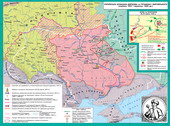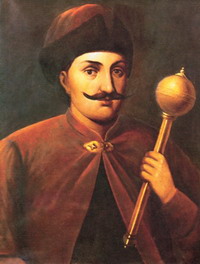UKRAINE during the reign of Hetman Ivan Vigovsky
basic thesis
And - van Vyhovsky - prominent statesmen, politicians continuer Bogdan Khmelnitsky, aimed at achieving full independence of the Ukrainian state to strengthen its international authority.
- Battle of Konotop - example just struggle for the liberation of his people from foreign domination, to protect their own independent state.
CHRONOLOGY OF EVENTS
|
1657, August 26 |
Cossack officers' advice in Chyhyryn decided to adulthood Y. Khmelnitsky pass hetman Ivan Vyhovsky. |
|
1657, October |
General Council in Korsun Cossack Hetman I. Vyhovsky recognized. |
|
1657, October |
Conclusion I. Vyhovsky union with Sweden. |
|
1658, May |
defeat host troops Vyhovsky II anti-opposition and J. M. Pushkar Barabash at Poltava. |
|
1658, September |
the Ukrainian-Polish armistice in Gadyach. Termination of the National Liberation War. |
|
1658-1659 he |
Ukrainian-Muscovite War. |
|
1659, June 28 |
Battle of Konotop. |
Personality
Nemyrych Yuri - outstanding statesman and political figure. He came from an old aristocratic family in Kiev and belonged to the wealthiest aristocrats of the Commonwealth. He received an excellent education, studying at the University of Leiden, Amsterdam, Oxford and Cambridge. Completing studies at the Sorbonne, in Paris, gave young Latin own work entitled "Exploration of Moskovytynsku war", which compared the political structure of Muscovy and the Commonwealth. On the other side of Bogdan Khmelnitsky Nemyrych passed in July 1657, a few weeks before his death hetman. After being elected as hetman Vyhovsky immediately became his assistant and advisor. Participated in preparation of documents Hadiach contract. According to the treaty was to take place Chancellor Grand Duchy of Rus.
PERSON
John Vyhovsky came from an ancient family of the Ukrainian Orthodox gentry. Education acquired in the Kyiv Mohyla Academy. He knew several languages, including Latin. National War broke out on the Polish side Vyhovsky - he was captain kvartsyanoho troops. During the battle came to Zhovtovods'ka Tatar captivity. Three escaped, three were caught Horde and it probably would be executed, if not Bohdan Khmelnytsky, who bought Vyhovsky free. Soon the war became general secretary and close associate of Khmelnitsky. He was carring Registry 1649, co-author of numerous proclamations and letters hetman. In 1648 Vyhovsky built administrative and diplomatic headquarters Khmelnytsky original Ministry of Foreign and Internal Affairs - General Military Chancellery. Chairing it until the death of Hetman, general clerk was unchanged in utayemnychenyy most secret affairs. As one contemporary wrote, "... no colonel did not know that thought Inc - one only Vyhovsky .". Vyhovsky was more flexible than Khmelnitsky, and this created additional opportunities for diplomatic combinations.
SITUATION IN UKRAINIAN STATE AFTER DEATH Bogdan Khmelnitsky
internal situation of the Ukrainian state after the death of Khmelnytsky mainly stems from external factors.
- split union of the Commonwealth.
- Transylvania defeated.
- Brandenburg governor separated from the Commonwealth and Prussia finally combined it with Brandenburg.
- Sweden, involved in the war of Denmark, has withdrawn troops from Poland and soon entered into peace agreements with Russia and the Commonwealth.
- Poland , to take revenge for the humiliating defeat of Ukrainian past years, together with the Crimean Khanate has begun preparations for the new War.
- resorted to the offensive against the independence of the Ukrainian state and the royal government. The evidence that was "sex" (points), with description of major new vision of the throne of the Ukrainian-Russian relations, which brought them to the king's ambassador Chyhyryn A. Matveev.
They included looking at that
1) in major Ukrainian cities have to stand with an army of the king's magistrates, they should refrain from the local population, 2) taxes on rental income and mills have come to the royal treasury, and 3) the number of registered Cossacks should be reduced to 10 - 40 thousand people., 4) continue to be nominated Hetman coordinate with the king, 5) elected metropolitan of Kiev must be sent to the dedication of the Moscow Patriarch, etc..
|
main reason for changing the course of the Russian state of Ukraine in the summer of 1657 was dissatisfaction with the Moscow government that still does not have real control over the territory of Zaporizhia Army and the Ukrainian leadership has consistently evading the provisions of the treaty in 1654 on the restriction of international relations Hetman's government and tax collection in the royal treasury. |
On the domestic situation of the Ukrainian State and Affected long war.
- situation is compounded by the deepening conflict between supporters of different foreign policy orientations between the right bank and left bank shelves.
I. Getman Vyhovsky its external and internal policy
Election Ivan Vyhovsky
yet for the life of Bogdan Khmelnitsky, 5-11 April 1657, officers' council made a decision on the transfer of power after the death of Hetman his 16-year-old son George.
Implementation of the decisions in life would mean the introduction of the Hetman's power succession, ie the establishment in Ukraine of the monarchical form of government.
- But after the death of Hetman Khmelnytsky situation has changed. 23-26 August in Chyhyryn held officers' council, which hetman to adulthood Yuras Khmelnytsky, was elected the secretary general John Vyhovsky.
Foreign Policy John Vyhovsky
- In the foreign policy of the newly elected Hetman sought to continue the policy of Bogdan Khmelnitsky, aimed at achieving full independence of the Ukrainian state and strengthening its international authority.
- Already on the Cossack General Council in Korsun October 25, 1657 received ambassadors from Sweden, Poland, Austria, Turkey, Crimea, Transylvania, Moldavia and Wallachia.
- There has finalized an agreement with Sweden. He envisioned the creation of Ukrainian-Swedish military and political alliance, which was to ensure the independence and territorial integrity of Ukraine.
- Council also decided to restore the alliance with Turkey and the Crimean Khanate, and conclude a truce with Poland.
However - Hetman Vyhovsky tried to avoid complications in relations with Moscow.
- the king sent the embassy with information on the election of a new hetman.
In Moscow - long delayed the recognition Vyhovsky Hetman, requiring him many concessions, especially the introduction to the major cities - Pereiaslav Nizhyn Chernihiv and Moscow Pledges led by rulers.
- This would allow Moscow to interfere in the internal affairs of Ukraine and its not limited to dependence. Required to conduct new elections with the participation of the king's representatives.
- Vyhovsky had to accept the king's demands, hoping that Moscow's assault on the cease.
- After the February 1658 board in Pereyaslav, which confirmed the election of Vyhovsky Hetman, magistrates were allowed to come to Ukraine.
Domestic Policy John Vyhovsky
- its domestic policies, John Vyhovsky sought primarily to satisfy the interests of officer leadership and Ukrainian pokozachenoyi nobility, that acted as most Western rulers.
- generous gifts of land and privileges of those in power have caused discontent poor peasants and Cossacks. Increase in internal strain used Poltava colonel Martyn Pushkar , who himself sought the Hetman's mace, and Cossack chieftain Jacob Barabash.
- the support they organized a revolt in Moscow, broke troops near Poltava colonel Ivan Bohun and John Serbyn possess the Poltava and Lubensky regiments.
Hetman - Calls to end the civil war were not so Vyhovsky had to take drastic measures. In May 1658 the hetman's army at Poltava troops smashed the rebels. Pushkar killed in battle, and Barabash captured and executed.
After the suppression of rebellion - Moscow government openly interfere in Ukrainian affairs, providing material support to opponents of the Hetman.
Hadiach AGREEMENT
double game in Moscow, which for its own interests provoked uproar Pushkar, Moscow government has demonstrated the desire to conquer the Ukraine.
It made
Vyhovsky again think about finding another ally. After much hesitation he decided to turn to the Commonwealth.
In
Gadyach September 6, 1658 Hetman between Ukraine and Poland have signed an agreement titled the Hadiach.
- Ukraine, Poland and Lithuania formed a federation of three autonomous states, united only jointly elected King.
- Ukraine in the Kiev, Chernigov and Bratslav province became an independent state called the Grand Duchy of Rus'.
- highest legislature in the Grand Duchy Ruthenian deputies belonged to the Duchy of all lands, and executive - to concentrate in the hands of the hetman, who was elected for life and would zatverdzhuvavsya King.
- assumed that the Grand Duchy of Rus have their own judicial and financial system was to make its own monetary policy.
- Ukrainian army number was 30 thousand and 10 thousand Cossack mercenary troops.
- Church had to cancel the union in all three states.
- Orthodox church had to have the same rights as Roman Catholic.
- envisages the creation of two universities, one of them received the status of Academy (Kiev-Mohyla Academy), as well as colleges, high schools, different schools and printing presses.
- introduced complete freedom of speech and press.
Hadiach contract was more deliberate and precise than the treaty of 1654 and, unfortunately, was never to realize, moreover, that Poland was not going to comply with its terms.
Moscow-UKRAINIAN WAR 1658-1659 he
main reason Russian-Ukrainian war 1658-1659 biennium was incompatible approaches Hetman and the tsarist government on further developing bilateral relations:
- Russia , aiming to become the most powerful power in eastern Europe and in the Orthodox world in general, wanted to seize Ukraine and Ukraine - on the contrary, sought to strengthen their own state under the protection of Moscow but without actual inclusion in the Russian space imperative.
Major events - Muscovite-Ukrainian war 1658-1659 biennium unfolded in the spring-summer 1659
- end of March 1659 more than 100-man Russian army led by prince Trubetskoy O. moved to Ukraine.
- April 20 it was stopped at Konotop, Chernihiv Cossacks who defended and Nijinsky Nijinsky regiment under the command of Colonel Gregory Gulyanitskii. Almost two months Cossacks held the siege.
- Vyhovsky during this time preparing for a decisive battle. Getman agreed with the Crimean khan help 40000th bands and generally had about 60 thousand soldiers. Soon the coalition army acted to help the surrounded.
- main battle took place June 28, 1659 in the area. Sosnivka of Konotop. She ended the worst of Moscow's troops.
End Hetman Vyhovsky
- resounding victory at Konotop not put an end to strife in Ukraine. Among the Ukrainian was not on the future unity of the homeland. Independent Ukraine each group understood in its own defending its own interests first.
So - soon Konotop battle broke out a new anti-government insurgency, led by Yuri Khmelnytsky was asked.
Causes Uprising
- rank and file Cossacks and peasants supported him, fearing that with the introduction Hadiach treatise back national religious oppression and boon.
- Benches insurgents increased and those who did not want to weaken Moscow as a possible ally in the struggle against Poland.
- the rebels pryluchalysya Left Bank residents, because they are scared a possible war against Muscovy, which opened out on to their land.
- in September 1659 under Hermanivka gathered in Kiev region Cossack Council.
- Cossacks refused to recognize Hadiach treatise, opposed the alliance with the Polish king and expressed confidence hetman Vyhovsky.
After the council - Vyhovsky not wanting Ukraine's new disaster that caused a civil war, resigned mace and went to his native Volyn, which was then ruled by the Polish king and was elected Hetman Yurii Khmelnytsky.
 English
English

